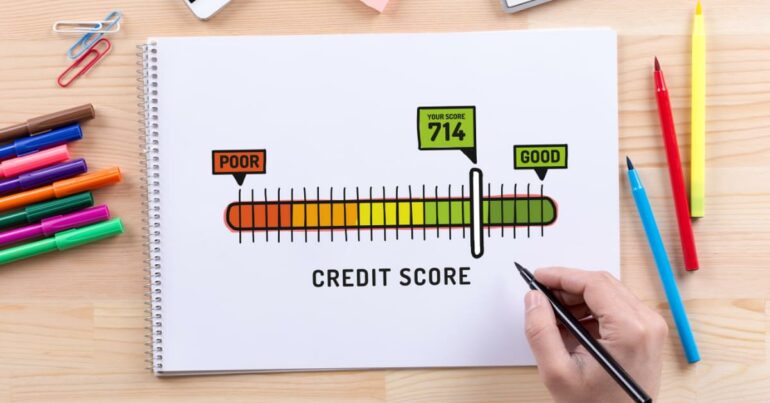
Moving to another country is a life-enhancing opportunity to start afresh in new surroundings, meet interesting people, and embrace a different culture. To carve out a new life for yourself overseas, you will have to lay foundations socially, professionally, and financially. Establishing your financial identity is an important step when you move or immigrate to a different country. It allows you to access various financial services that will help you to build a healthy credit score.
Why building your credit score is important
Building a healthy credit score is important because it demonstrates your ability to manage debt responsibly and establishes trust with lenders. This provides financial institutions, landlords, utility providers and employers with the reassurance they need to engage with you – making the settling-in process much more enjoyable.
Access to loans and credit
A strong credit score is often a prerequisite for obtaining loans and credit cards. Lenders and financial institutions use credit scores to assess your creditworthiness and determine whether you qualify for credit. A higher credit score increases your chances of being approved for loans and credit because you will be considered suitable to make repayments, and it can result in better interest rates and terms.
Renting a home
Landlords and property management companies often assess credit scores when evaluating rental applications. A higher credit score can give you an advantage in the rental market, as it demonstrates financial responsibility and a history of paying bills on time. It may help you secure a desirable rental property and negotiate better rental terms.
Lower interest rates
A good credit score can lead to lower interest rates on loans and credit cards. When you have a higher credit score, lenders consider you to be less risky, and are, therefore, more likely to offer you favourable interest rates. Over time, lower interest rates can save you a significant amount of money on interest payments.
Employment opportunities
Employers may review credit reports as part of their hiring process, particularly for positions involving financial responsibilities or access to sensitive information. A good credit score can contribute to a positive impression and may enhance your chances of securing a job.
Insurance premiums
Aware of a correlation between credit scores and the likelihood of filing claims, insurance companies sometimes consider credit scores when determining premiums for auto, home, or other types of insurance. Maintaining a good credit score may result in lower insurance premiums.
Utility services and mobile phone contracts
Providers may review your credit score when registering for utilities such as electricity, water, or broadband, or when applying for a mobile phone contract. A higher credit score can increase your chances of approval and may even help you avoid security deposits or secure more favourable terms.
How to build your credit score
Building credit is a gradual process, so it’s essential to manage your finances responsibly over time. By following these steps and demonstrating good financial habits, you can build a strong credit score as an immigrant, helping you to establish your financial identity in your new home:
Open a bank account
Start by opening a checking and/or savings account with a local bank or credit union. This demonstrates your ability to manage your finances responsibly and establishes a banking relationship.
Apply for a secured credit card
A secured credit card is designed for individuals with limited or no credit history. You’ll need to provide a security deposit, which acts as collateral for your credit limit. Use the card responsibly, making small purchases and paying off the balance in full each month. Over time, this will help build a positive credit history.
Explore credit builder loans
Some financial institutions offer credit builder loans specifically designed to help individuals establish credit. With these loans, the lender holds the loan amount in a secured account while you make monthly payments. Once the loan is paid off, the funds are released to you, and you’ll have established a positive credit history.
Become an authorised user
If you have a trusted family member in your new home with good credit, ask if they would be willing to add you as an authorised user on one of their credit cards. Their positive payment history will be recorded on your credit report, helping to build your credit.
Pay bills on time
Ensure that you pay all your bills, including rent, utilities, and any other regular payments, on time. While these payments might not directly impact your credit score initially, some credit scoring models consider them over time.
Monitor your credit report
Regularly check your credit report to ensure all information is accurate and up to date. You can obtain a free copy of your credit report annually from each of the major credit reporting agencies (Equifax, Experian, or TransUnion).
Establish a good payment history
Consistently paying your bills on time and maintaining low credit utilisation will help to gradually build a positive credit history. Lenders want to see that you are a responsible borrower.
Keep credit utilisation low
Try to keep your credit utilisation ratio – the amount of credit you’re using compared to your total credit limit – below 30%. Keeping it low shows that you’re not overly reliant on credit.
Be patient and persistent
Building credit takes time and consistent effort. As you establish a positive credit history, your credit score will improve, allowing you to access better credit opportunities in the future.
Currency transfers
Your credit score is primarily based on your credit history and financial behaviour within your country of residence. Therefore, international currency transfers do not directly impact your credit score. However, international currency transfers can indirectly affect your credit score.
Here are two scenarios to consider:
Currency exchange fees
When you transfer money internationally, you may be exposed to fees related to currency exchange. These fees are not directly linked to your credit score but can impact your overall financial situation. If you consistently incur high fees or struggle with managing currency exchange costs, it could affect your ability to manage your finances effectively and potentially impact your credit score indirectly.
Repaying debts
If you have international debts or loans, transferring funds internationally may be necessary to make payments. Consistently repaying your debts on time and in full will positively impact your credit history and can improve your credit score over time.
Search for the best deal on your international transfers by comparing the world’s leading foreign exchange companies here.
Tom Vicary
Author









